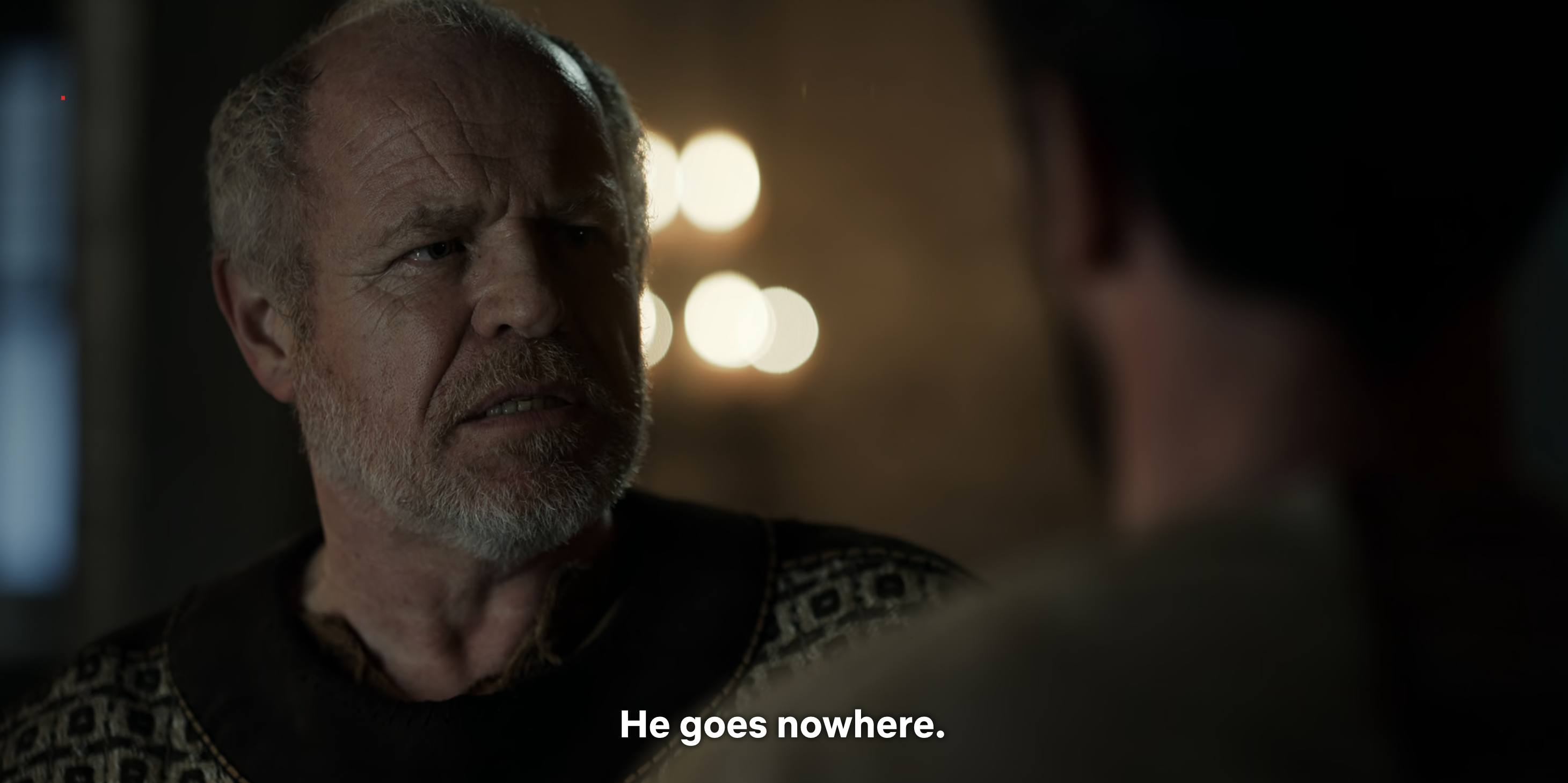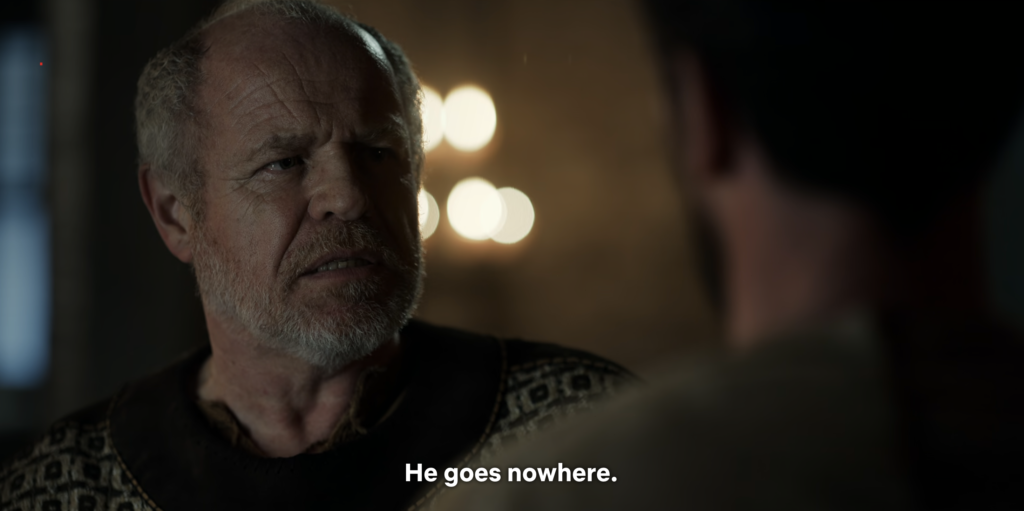
Posted by Edward Mills
2 September 2024Vikings: Valhalla is a spin-off series from the phenomenally successful Vikings, which ran for six series (largely on History in Canada and Ireland, where it was co-produced) between 2013 and 2018. As its name suggests, the original series followed the exploits of a number of (semi-historical) Viking figures from the first raids on the monastery at Lindisfarne onwards. For linguists such as myself, though, there’s long been another interesting element to the series: namely, that it (along with its sequel) incorporates spoken ancient languages as part of its world-building.
As the series travels with the Vikings, the variety of languages encountered grows with them, with the series eventually including passages in Latin, varieties of medieval Greek, Old French, and Mi’kmaq. Characters don’t speak in their ‘authentic’ language constantly; instead, the writers deploy it either to stress the ‘otherness’ of a given group needs (as in the encounter above), for moments of high ceremony or tension (such as the princess Gisla’s memorable denunciation of Rollo), or where a failure to communicate becomes an important plot point (witness Rollo’s memorable attempt to learn French from the fourth series). With Old Norse in particular, ancient languages are also a powerful tool for simply adding flavour, and for immersing the audience in a world that sounded very different to our own.
Imagine my delight, then, when I got a message on Twitter (as it then was) asking if I would be interested in contributing some dialogue to the soon-to-film third series of the spin-off, Vikings: Valhalla. The scene in question, as it turned out, was a look inside the head of William the Conqueror as he has a recurring nightmare, which culminates in the murder of his guardian, Osbern. William had ascended to the throne at a young age, with several of his guardians being murdered during a series of struggles for control over the duchy of Normandy. In William’s flashback, Osbern admonishes a member of William’s family, who claims that as a ‘kinsman’ of William, he should have custody of the young Duke; William, only half understanding all this, plays in the corner.
As luck would have it, I didn’t know all this; instead, my brief was to translate the dialogue below into ‘Norman French, to be spoken in the court of Duke William (pre-Conquest’), for inclusion in the third episode of the series. Here’s what I came up with: the English text is on the left, with my proposed translation on the right.
| WALTER (o.s.) | WALTER (o.s.) |
| The Duke is mine! I am his kinsman! | Li dus a mei appurtinét! Jo sui sun cusin! |
| You have no right to claim him! | Il n’est mie reisun ke li purfichais! |
| OSBERN (firm) | OSBERN (firm) |
| And you care only for his title. | Ha! Ne le teins mie pur cosin. Cest ren n’ad riens ke te ple[s]t, fors sun nun. |
| Just like everyone in your sister’s family, fighting among yourselves for crumbs from his table. | A la nasciun ta seror resembles : pur denrez vus estrivez tuz, e pur les mies ke gete li dus de sa table. |
| That’s why his father left him in my care. | Pur ço sun pedre en ma cure l’ad mis. |
| He goes nowhere. | Ci esterad. |
If you’ve watched the episode (available now on Netflix, from around 5 minutes onwards), you’ll notice that only the final portion of my translation made it into the scene. While I don’t know precisely what happened here, there are many (entirely reasonable) possible explanations, not least the short time-frame in which the actors had to learn the lines (I was asked to translate them a couple of days before filming). The English dialogue also changed quite a bit between the ‘white script’ (which I was sent) and the final broadcast version, with a lot of detail about Walter’s family being cut, so there was already less material for the actors to work with. Alternatively, maybe someone in the audio department realised that the combination of reverb and an unfamiliar ancient language was a bit too much for the audience. In any case, the solution that the directors settled on certainly works well: most of the piece is in English for intelligibility, while the final jibe — ‘he goes nowhere’ — is in French, for flavour.

Given half a chance, I’d happily fill a whole other blog post with witterings about the finer points of my translation. To give just a glimpse under the hood, the final sentence doesn’t strictly mean ‘he goes nowhere’ (which would be something like nule part ne vait), since this would have introduced ambiguity into the French: is Osbern making a declarative statement here, describing how William usually remains in his care, or an emphatic one, swearing that the young Duke will always stay with him? Since it’s pretty clear from context that it’s the latter, I opted for what translators call a modulation, getting Osbern instead to say ci esterad (literally ‘he will stay here’).
For now, though, I’ll simply end by thanking the team at Visual Artefact for allowing me to get involved with this fascinating project. It’s not every day that you get to translate into medieval French, and I can only hope that any opportunities for further work in this area don’t meet the same fate as Osbern. (Spoilers.)
One response to “‘He goes nowhere’: writing medieval French for Netflix”
[…] edited collections and critical editions to more modern outfits such as podcasts, social media, television consulting, and even cartoons. At last week’s ‘Life After the Doctorate’ […]